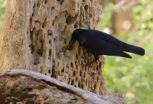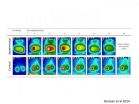(Press-News.org) The immune system has evolved to recognize and respond to threats to health, and to provide life-long memory that prevents recurrent disease. A detailed understanding of the mechanism underlying immunologic memory, however, has remained elusive. Since 2001, various lines of research have converged to support the hypothesis that the persistence of immune memory arises from a reservoir of immune cells with stem-cell-like potential. Until now, there was no conclusive evidence, largely because experiments could only be carried out on populations of cells. This first strict test of the stem cell hypothesis of immune memory was based on mapping the fates of individual T cells and their descendants over several generations.
That experimental capability was developed through a long-term collaboration, focused on clinical cell processing and purification, between researchers based in Munich and Seattle. Since 2009, the groups of Prof. Dirk Busch at the Technische Universität München (TUM) and Prof. Stanley Riddell at the Fred Hutchinson Cancer Research Center have combined their technological and clinical expertise under the auspices of the TUM Institute for Advanced Study. The University of Heidelberg, the University of Düsseldorf, the Helmholtz Center Munich, the German Cancer Research Center (DKFZ), and the National Center for Infection Research (DZIF) also contributed to the present study.
Homing In On The "Stemness" of T Cells
After generating an immune response in laboratory animals, TUM researchers Patricia Graef and Veit Buchholz separated complex "killer" T cell populations enlisted to fight the immediate or recurring infection. Within these cell populations, they then identified subgroups and proceeded with a series of single-cell adoptive transfer experiments, in which the aftermath of immune responses could be analyzed in detail. Here the ability to identify and characterize the descendants of individual T cells through several generations was crucial.
The researchers first established that a high potential for expansion and differentiation in a defined subpopulation, called "central memory T cells," does not depend exclusively on any special source such as bone marrow, lymph nodes, or spleen. This supported but did not yet prove the idea that certain central memory T cells are, effectively, adult stem cells. Further experiments, using and comparing both memory T cells and so-called naive T cells – that is, mature immune cells that have not yet encountered their antigen – enabled the scientists to home in on stem-cell-like characteristics and eliminate other possible explanations.
Step by step, the results strengthened the case that the persistence of immune memory depends on the "stemness" of the subpopulation of T cells termed central memory T cells: Individual central memory T cells proved to be "multipotent," meaning that they can generate diverse types of offspring to fight an infection and to remember the antagonist. Further, these individual T cells self-renew into secondary memory T cells that are, again, multipotent at the single-cell level. And finally, individual descendants of secondary memory T cells are capable of fully restoring the capacity for a normal immune response.
Insights With Clinical Potential
One implication is that future immune-based therapies for cancers and other diseases might get effective results from adoptive transfer of small numbers of individual T cells. "In principle, one individual T cell can be enough to transfer effective and long-lasting protective immunity for a defined pathogen or tumor antigen to a patient," says Prof. Dirk Busch, director of the Institute for Medicial Microbiology, Immunology and Hygiene at TUM. "Isn't that astonishing?"
"These results are extremely exciting and come at a time when immunotherapy is moving into the mainstream as a treatment for cancer and other diseases," says Prof. Stanley Riddell of the Fred Hutchinson Cancer Research Center and the University of Washington. "The results provide strong experimental support for the concept that the efficacy and durability of T cell immunotherapy for infections and cancer may be improved by utilizing specific T cell subsets."
INFORMATION:
This research was supported by the German Research Foundation (DFG) through SFB TR36 (TP-B10/13) and SFB 1054 (TP-B09); by the Initiative and Networking Fund of the Helmholtz Association within the Helmholtz Alliance on Immunotherapy of Cancer; by the Federal Ministry of Education and Research (BMBF) through the e:Bio program (T-Sys); and by the U.S. National Science Foundation under Grant No. NSF PHY11-25915.
Publication
"Serial transfer of single cell-derived immunocompetence reveals stemness of CD8+ central memory T cells," Patricia Graef, Veit R. Buchholz, Christian Stemberger, Michael Flossdorf, Lynette Henkel, Matthias Schiemann, Ingo Drexler, Thomas Höfer, Stanley R. Riddell, and Dirk H. Busch. Immunity, Vol. 41, Issue 1, July 17, 2014. DOI: 10.1016/j.immuni.2014.05.018
Contact
Prof. Dr. Dirk Busch
Institute for Medical Microbiology, Immunology and Hygiene
Technische Universität München
Tel: +49 89 4140 4120
dirk.busch@tum.de
http://www.mikrobio.med.tu-muenchen.de
Experiments prove 'stemness' of individual immune memory cells
A fundamental finding with implications for clinical cell therapy
2014-07-24
ELSE PRESS RELEASES FROM THIS DATE:
Newly discovered gut virus lives in half the world's population
2014-07-24
Odds are, there’s a virus living inside your gut that has gone undetected by scientists for decades. A new study led by researchers at San Diego State University has found that more than half the world’s population is host to a newly described virus, named crAssphage, which infects one of the most common types of gut bacteria, Bacteroidetes. This phylum of bacteria is thought to be connected with obesity, diabetes and other gut-related diseases. The research appears today in Nature Communications.
Robert A. Edwards, a bioinformatics professor at SDSU, and his colleagues ...
Using media as a stress reducer can lead to feelings of guilt and failure
2014-07-24
Washington, DC (July 21, 2014) – It seems common practice. After a long day at work, sometimes you just want to turn on the TV or play a video game to relax, decompress. This is supposed to make you feel better. But, a recent study published in the Journal of Communication, by researchers at the Johannes Gutenberg University Mainz, Germany, and VU University Amsterdam, found that people who had high stress levels after work and engaged in television viewing or video game play didn't feel relaxed or recovered, but had high levels of guilt and feelings of failure.
Leonard ...
Stronger early reading skills predict higher intelligence later
2014-07-24
A new study of identical twins has found that early reading skill might positively affect later intellectual abilities. The study, in the journal Child Development, was conducted by researchers at the University of Edinburgh and King's College London.
"Since reading is an ability that can be improved, our findings have implications for reading instruction," according to Stuart J. Ritchie, research fellow in psychology at the University of Edinburgh, who led the study. "Early remediation of reading problems might aid not only the growth of literacy, but also more general ...
Community service programs that include reflection found to be more beneficial to youth
2014-07-24
Adolescents in some countries and U.S. states are required to perform community service, and many national and nongovernmental agencies promote such service. A new study has found that while community service has broad benefits for adolescents, it is particularly effective when the activities are accompanied by reflection and discussion.
The study, by researchers at Utrecht University and Rutgers University, appears in the journal Child Development.
Researchers used meta-analysis to assess findings from 49 studies from around the world that were conducted from 1980 ...
Stress tied to change in children's gene expression related to emotion regulation, physical health
2014-07-24
Children who have been abused or neglected early in life are at risk for developing both emotional and physical health problems. In a new study, scientists have found that maltreatment affects the way genes are activated, which has implications for children's long-term development. Previous studies focused on how a particular child's individual characteristics and genetics interacted with that child's experiences in an effort to understand how health problems emerge. In the new study, researchers were able to measure the degree to which genes were turned "on" or "off" through ...
Study links autistic behaviors to enzyme
2014-07-23
RIVERSIDE, Calif. — Fragile X syndrome (FXS) is a genetic disorder that causes obsessive-compulsive and repetitive behaviors, and other behaviors on the autistic spectrum, as well as cognitive deficits. It is the most common inherited cause of mental impairment and the most common cause of autism.
Now biomedical scientists at the University of California, Riverside have published a study that sheds light on the cause of autistic behaviors in FXS. Appearing online today (July 23) in the Journal of Neuroscience, and highlighted also on the cover in this week's print issue ...
New York law offers nurses more recognition, responsibility
2014-07-23
(NEW YORK, NY, July 24, 2014) – If past experience is anything to go by, nurse practitioners in New York State are about to get a lot more recognition for their contributions to primary care. In Massachusetts, laws already on the books allowing NPs to provide primary care offer nurses more recognition of their contributions to patient care and better relationships with physicians and administrators, compared with colleagues in New York, according to a study from Columbia University School of Nursing, published in Health Care Management Review.
"This suggests that the ...
Smarter than a first-grader?
2014-07-23
In Aesop's fable about the crow and the pitcher, a thirsty bird happens upon a vessel of water, but when he tries to drink from it, he finds the water level out of his reach. Not strong enough to knock over the pitcher, the bird drops pebbles into it — one at a time — until the water level rises enough for him to drink his fill.
Highlighting the value of ingenuity, the fable demonstrates that cognitive ability can often be more effective than brute force. It also characterizes crows as pretty resourceful problem solvers. New research conducted by UC Santa Barbara's Corina ...
How honey bees stay cool
2014-07-23
MEDFORD/SOMERVILLE, Mass. – Honey bees, especially the young, are highly sensitive to temperature and to protect developing bees, adults work together to maintain temperatures within a narrow range. Recently published research led by Philip T. Starks, a biologist at Tufts University's School of Arts and Sciences, is the first to show that worker bees dissipate excess heat within a hive in process similar to how humans and other mammals cool themselves through their blood vessels and skin.
"This study shows how workers effectively dissipate the heat absorbed via heat-shielding, ...
Hormones after breast cancer: Not fuel for the fire after all?
2014-07-23
A new study supports a growing body of research suggesting a safe and effective role for natural steroid hormones in treating postmenopausal breast cancer, with fewer detrimental side effects and improved health profile than with standard anti-hormone therapies. The study will be published in final format today in the open-access journal Reproductive Biology and Endocrinology.
Breast cancer is the most frequently diagnosed cancer in women in the United States. Approximately 70% of breast cancers are diagnosed in postmenopausal women. Major clinical trials and experimental ...
LAST 30 PRESS RELEASES:
Prolonged drought linked to instability in key nitrogen-cycling microbes in Connecticut salt marsh
Self-cleaning fuel cells? Researchers reveal steam-powered fix for ‘sulfur poisoning’
Bacteria found in mouth and gut may help protect against severe peanut allergic reactions
Ultra-processed foods in preschool years associated with behavioural difficulties in childhood
A fanged frog long thought to be one species is revealing itself to be several
Weill Cornell Medicine selected for Prostate Cancer Foundation Challenge Award
Largest high-precision 3D facial database built in China, enabling more lifelike digital humans
SwRI upgrades facilities to expand subsurface safety valve testing to new application
Iron deficiency blocks the growth of young pancreatic cells
Selective forest thinning in the eastern Cascades supports both snowpack and wildfire resilience
A sea of light: HETDEX astronomers reveal hidden structures in the young universe
Some young gamers may be at higher risk of mental health problems, but family and school support can help
Reduce rust by dumping your wok twice, and other kitchen tips
High-fat diet accelerates breast cancer tumor growth and invasion
Leveraging AI models, neuroscientists parse canary songs to better understand human speech
Ultraprocessed food consumption and behavioral outcomes in Canadian children
The ISSCR honors Dr. Kyle M. Loh with the 2026 Early Career Impact Award for Transformative Advances in Stem Cell Biology
The ISSCR honors Alexander Meissner with the 2026 ISSCR Momentum Award for exceptional work in developmental and stem cell epigenetics
The ISSCR honors stem cell COREdinates and CorEUstem with the 2026 ISSCR Public Service Award
Minimally invasive procedure effectively treats small kidney cancers
SwRI earns CMMC Level 2 cybersecurity certification
Doctors and nurses believe their own substance use affects patients
Life forms can planet hop on asteroid debris – and survive
Sylvia Hurtado voted AERA President-Elect; key members elected to AERA Council
Mount Sinai and King Saud University Medical City forge a three-year collaboration to advance precision medicine in familial inflammatory bowel disease
AI biases can influence people’s perception of history
Prenatal opioid exposure and well-being through adolescence
Big and small dogs both impact indoor air quality, just differently
Wearing a weighted vest to strengthen bones? Make sure you’re moving
Microbe survives the pressures of impact-induced ejection from Mars
[Press-News.org] Experiments prove 'stemness' of individual immune memory cellsA fundamental finding with implications for clinical cell therapy



